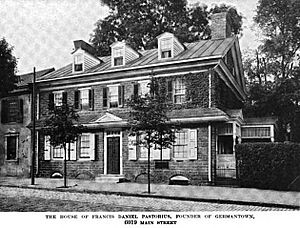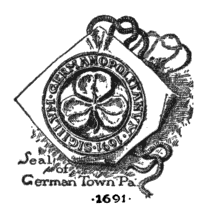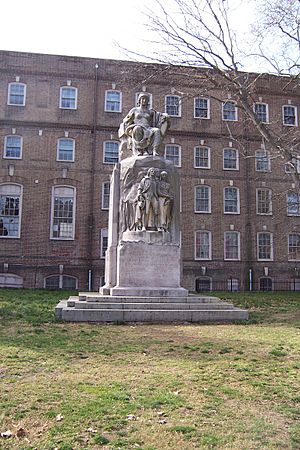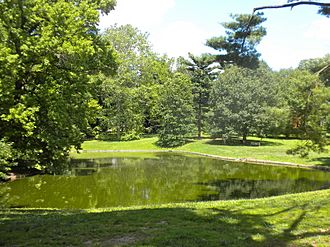Francis Daniel Pastorius facts for kids
Quick facts for kids
Francis Daniel Pastorius
|
|
|---|---|
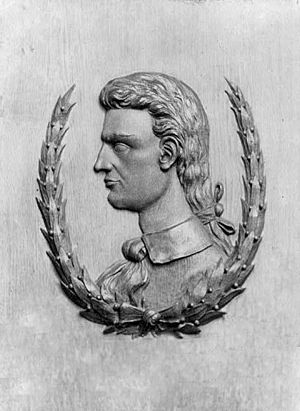
Bas-relief impression of Francis Daniel Pastorius, c. 1897
|
|
| Born |
Franz Daniel Pastorius
September 26, 1651 Sommerhausen, Franconian Circle, Holy Roman Empire
|
| Died | 1720 (aged 68–69) |
| Occupation | lawyer, poet, scholar, schoolteacher, abolitionist, founder of Germantown, Pennsylvania |
| Spouse(s) |
Ennecke Klostermanns (1658–1723)
(m. 1688) |
Francis Daniel Pastorius (born September 26, 1651, died around 1720) was a German-born educator, lawyer, and writer. He was also a public official. He is famous for founding Germantown, Pennsylvania. This area is now part of Philadelphia. It was the first lasting German-American settlement. It also became a key entry point for many German immigrants.
Contents
Early Life in Germany
Franz Daniel Pastorius was born in a town called Sommerhausen in Germany. His family was well-off and followed the Lutheran faith. He went to a good school, a Gymnasium, in Windsheim. His family moved there in 1659.
He studied to become a lawyer at top German universities. These included the University of Altdorf, the University of Strasbourg, and the Friedrich Schiller University of Jena. He began his law career in Windsheim and later worked in Frankfurt-am-Main.
Pastorius became good friends with Philipp Jakob Spener. Spener was a Lutheran religious leader. From 1680 to 1682, Pastorius traveled as a tutor with a young nobleman. They visited Germany, England, France, Switzerland, and the Netherlands.
Pastorius became unhappy with the Lutheran church and the government in Germany. He lived during a time called the Age of Absolutism. This meant kings had total power. His strong Christian beliefs even caused problems with his father. His father was a rich lawyer and mayor in Windsheim.
These issues became very clear between 1677 and 1679. After finishing his law degree, Pastorius returned to Windsheim. His family and friends, with support from the government, stopped a public uprising. This uprising was against unfair rulers. Because of this, he left Windsheim in 1679. He joined the Lutheran Pietists in Frankfurt. He always urged people to follow Christ's Golden Rule. Four years later, he moved to Pennsylvania and never went back home.
Moving to America
In 1683, some Mennonites, Pietists, and Quakers from Frankfurt wanted to buy land in Pennsylvania. They asked Pastorius to help them. He sailed on a ship called the America. He arrived in Philadelphia on August 20, 1683.
In Philadelphia, he bought 15,000 acres (about 61 square kilometers) from William Penn. Penn was the owner of the colony. Pastorius then planned the settlement of Germantown. He lived there until he died.
As a main leader in Germantown, Pastorius held many public jobs. He was the first mayor of Germantown. He also served in the Pennsylvania General Assembly in 1687 and 1691. In 1702, he started a school in Germantown. Both boys and girls could attend this school. This was unusual for the time. The suffragist Alice Paul later praised him for including girls.
His Writings
Pastorius wrote many things, from beekeeping to religion. He was considered an important early American poet. His large collection of notes and writings, called "commonplace compilations," show what life was like in early Pennsylvania.
His most important book was a manuscript called "Bee Hive." It is now kept at the University of Pennsylvania. This book is like his personal journal. It has poetry, his thoughts on religion and politics, and lists of books he read.
Another important work is his Geographical Description of Pennsylvania. It was first published in 1700. This book also includes many letters he sent home to Germany. He also wrote about gardening, law, farming, and medicine.
Personal Life
Pastorius married Ennecke Klostermanns on November 6, 1688. They had two sons: Johann Samuel Pastorius (1690–1722) and Heinrich Pastorius (1692–1726).
He was raised as an upper-class Lutheran. But as a young man in Germany, he became a Lutheran Pietist. In Pennsylvania, his beliefs became even more open-minded. He believed in universalism, meaning salvation for all. He also became very close to the Quaker faith.
The famous jazz bass guitarist Jaco Pastorius was a distant relative of Francis Daniel Pastorius.
His Legacy
Fighting Slavery
In 1688, Pastorius helped write the first protest against slavery in America. He signed the 1688 Germantown Quaker Petition Against Slavery. This was the first petition against slavery in the Thirteen Colonies.
Before the American Civil War, when people were working to end slavery, Pastorius was celebrated. The Quaker poet John Greenleaf Whittier wrote about Pastorius' life. He especially highlighted Pastorius' efforts against slavery in his poem The Pennsylvania Pilgrim.
Operation Pastorius
In 1942, during World War II, Nazi Germany used Pastorius' name for a secret plan. This plan was called "Operation Pastorius." It was a failed attempt to attack the United States. One of the targets was in Philadelphia. This was a misuse of his name, as he was a Quaker who believed in peace.
Places Named After Him
- The Pastorius Home Association runs the Pastorius Haus in Bad Windsheim, Germany. They also run the Pastorius House in Germansville, Pennsylvania.
- The Pastorius Monument is in Vernon Park in Northwest Philadelphia, PA.
- Pastorius Park is in the Chestnut Hill area of Philadelphia, PA.
Writings by Pastorius
- Deliciæ Hortenses, or Garden-Recreations, and Voluptates Apianæ, edited by Christoph E. Schweitzer (Columbia, South Carolina: Camden House, 1982).
- Francis Daniel Pastorius Reader: Writings by an Early American Polymath, edited by Patrick Erben (University Press: Penn State Press, 2019).
- Marion Dexter Learned, “From Pastorius’ Bee-Hive or Bee-Stock,” Americana Germanica 1, no. 4 (1879): 67-110.


